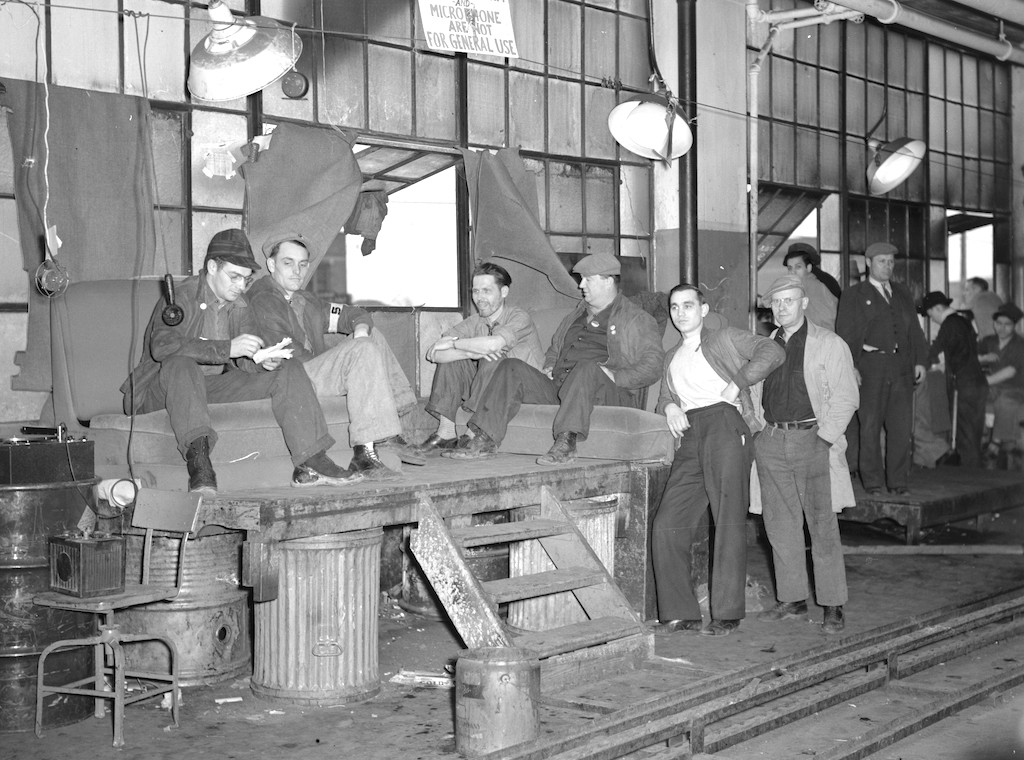
I just finished listening to the 9-episode podcast “Organizing the Unorganized” about the militant Congress of Industrial Organizations (CIO) union organizing of the 1930s and 40s by Benjamin Y. Fong and sponsored by Jacobin Magazine. Making this old but essential history accessible to today’s workers and activists is extremely important, and the show is generally well-produced and structured. The show itself is narrated by Fong, who alternates between interviews with historians, archival audio footage of union leaders, and his own narration to tie everything together. The 1930s and 40s is probably the most pivotal period in US labor history in terms of the degree of positive change of society generated (no doubt unevenly) by the labor movement. The radicalism, scale, and boldness of the unionists of that period created so much of the social good that workers in the US continue to sustain and enjoy today. For all of these features and reasons, the show is great and I couldn’t recommend it highly enough to those who are new to this period of union history.
And now it’s time for this grumpy Wobbly to register his complaints. The story of the CIO is told almost exclusively through the eyes of and the voices of the leaders of the CIO and its major unions. The rank-and-file are rightly credited with many of the achievements the CIO had in this period, but the show doesn’t ever really attempt to tell the story of the CIO from the viewpoint of the rank-and-file or the radical cadre who played such a major role. My guess is that partly this is out of convenience, because it’s a lot easier for the show to track down materials and the autobiographies and the speeches of the key leaders than it is to really dig around in the archives to find a more rank-and-file approach to telling this story. It’s more convenient to focus on the ideas and actions of a few top leaders than try to wrestle meaningfully with the immense complexity of the thousands of rank-and-file viewpoints and behaviors that make up the true substance of these unions. But so much is lost to this convenience, including in my opinion the most important lessons of the CIO.
But it’s not only due to convenience. The labor movement and its narrators then and today continue to lionize the top union officials often at the expense of the workers themselves, and this is a political choice with political consequences. The social democratic left that was what the top leadership of the CIO was closest to politically, and which Jacobin represents today, emphasizes organizational forms like parties and business unions that are intensely interwoven with the state and which act through their own top-down bureaucracy.
While the historians Fong interviews do give some airtime to the internal and grassroots critiques made within these unions about the union leaders and bureaucracy at times, those are more interludes than throughlines. In a certain sense, the rank-and-file becomes merely a supporting actor in a story about their organizations. That phrase “you are the union” so often rings hollow when the rank-and-file are marginalized in the very stories that are supposed to be about them.
I’m no expert on the subject, but my interests have led me to read some of the histories of the specific unions within the CIO in this period, and a lot of this history is told really well centered on the rank-and-file themselves while not losing sight of the larger picture. The CIO unions were intensely contested and in my own understanding of the period the leadership was more often than not acting in their own interests and against their rank-and-file, especially after the initial strike waves that many of these unions conducted. It was precisely the rank-and-file themselves that made these unions great, often in spite of their leaders. The actual close-up and rank-and-file histories are so much richer, and more complete, and more inspiring, and more plausible, and in my opinion way more radical than the focus on a few top leaders and the associated “great [union] man” theory of history which I’m afraid this show tends to succumb to.
Onward to my more personal gripe which is hardly a criticism but which I can’t help but re-iterating. I get frustrated when today’s rank-and-file unionists are not brought in to help tell this story or weigh in on the lessons or offer their own analysis. Listening to a bunch of historians is cool, and they like to give their own thoughts on what the past means to the present, but it’s largely not the historians who are organizing the unions today, the ones who are fighting many of the same battles the CIO fought 90 years ago. I think these kinds of productions would be enriched by finding some of today’s unionists to contribute to them too.
I know I may be asking too much of a 9-episode podcast about such a huge subject, but I want the best for the labor movement and I’ll be quick to point out where I think we deserve better. But yes, go and listen to it because it is still very good and its content is of extraordinary importance. Today’s labor movement has the potential to accomplish what the radicals in the CIO even did not. When the media of the future tells our stories, I’ll be damned if we don’t create a movement so powerful from below that it will be impossible to narrate it from above.
Go listen to Organize the Unorganized at Jacobin.
